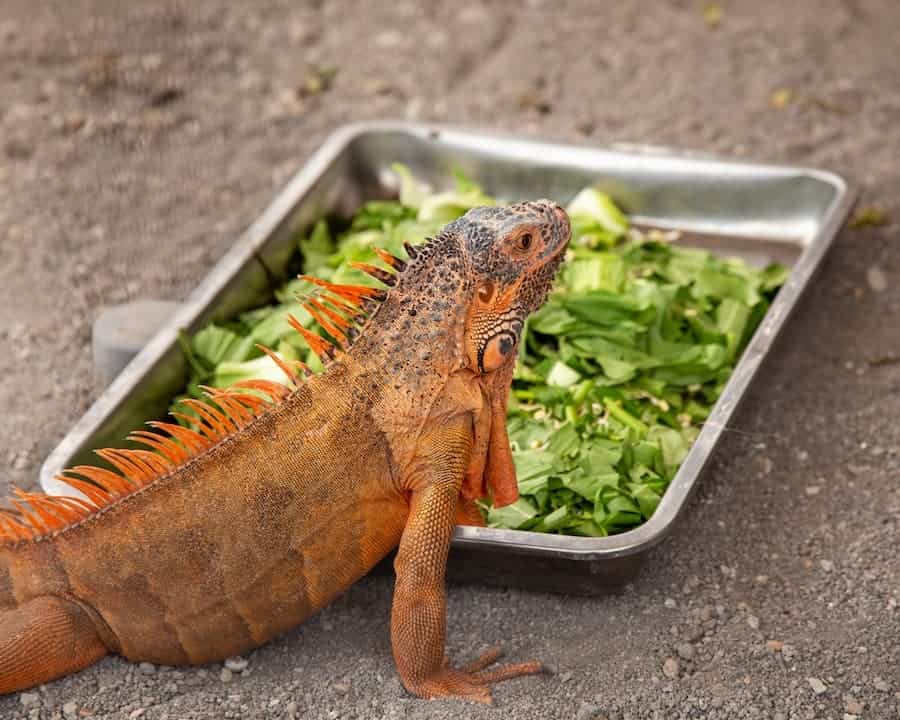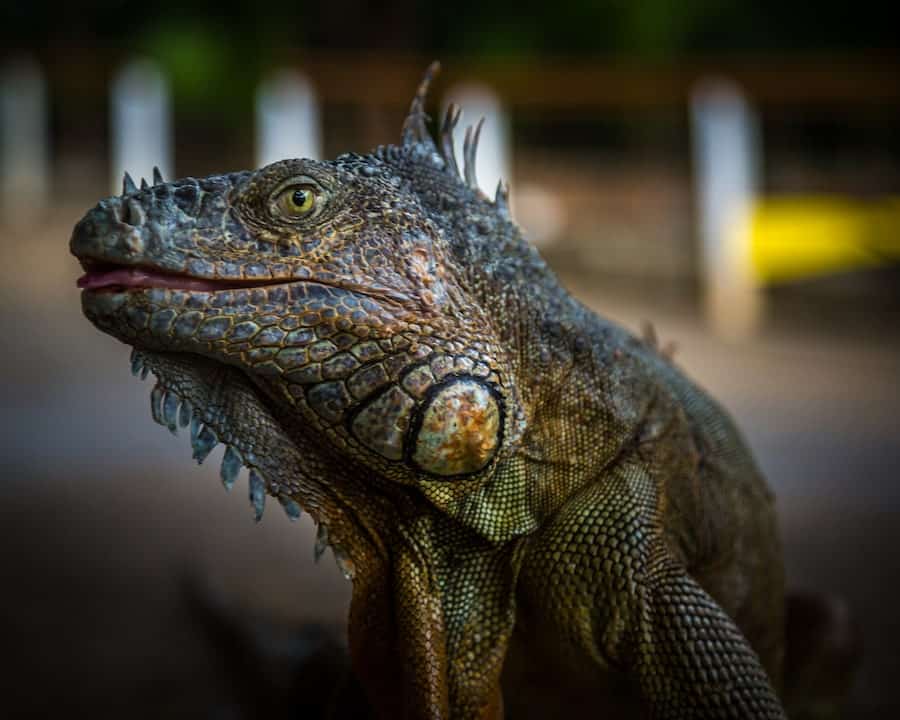Are you worried that your iguana may be dehydrated? Dehydration is a serious concern for iguana owners and can quickly become a life-threatening situation if it’s not addressed.
A dehydrated iguana may lose its appetite, have wrinkled skin, produce orange urine or exhibit other warning signs. It’s important to see a vet as soon as possible if the reptile is dehydrated.
Knowing the signs of dehydration is important for every iguana owner. I’m going to share the nine most important signs to look for and walk you through the steps of rehydrating your iguana.
1. Lethargy

When iguanas are dehydrated, they typically become more lethargic. Like humans, lizards become weak and sluggish when their bodies run low on fluids.
When moisture levels are running low, the body can’t operate as efficiently as normal. Your iguana will want to conserve as much energy as possible if he’s dehydrated and won’t be interested in doing much.
If you notice that your iguana seems more lethargic than normal, dehydration may be the issue. Consult with your vet to determine the underlying problem, as lethargy can also be a sign of other medical issues.
2. Loss of Appetite

Digestion requires moisture to help move things along. If your iguana doesn’t have enough moisture in its body, it may not be interested in food at all.
If your pet isn’t properly hydrated, digestion may be uncomfortable or unpleasant. Once your iguana is rehydrated, his appetite should return.
Dehydration is one of many reasons why iguanas lose their appetites. I recently wrote a post titled Top 15 Reasons Why Your Iguana is Not Eating that sheds some light on appetite issues.
3. Orange or Yellow Urine
A healthy, hydrated iguana’s urate is clear and somewhat viscous. If your iguana’s urates are greatly reduced, thick and yellow or orange in color, this is a sign that your pet needs more fluids.
Urates can also turn colors for other reasons, so it’s important to consult with your vet to see what’s going on.
4. Dry, Wrinkled, or Loose Skin

In his book “Green Iguana The Ultimate Owner’s Manual,” iguana expert James W. Hatfield says the best way to tell whether an iguana is dehydrated is to pinch his skin (gently!).
If the skin doesn’t pinch right back and stays up for a few seconds, your iguana needs more fluids. The best places to perform this test are on the arms and legs.
5. Sunken Eyes

When lizards become severely dehydrated, their eyes appear sunken. If it looks like your iguana’s eyes are sinking back into its skull, it’s time to see your vet.
Depending on the severity of the dehydration, your lizard may need fluids through an IV or intraosseous (IO) catheter.
Sunken eyes are not a symptom that should be ignored. Call your vet right away to get your pet rehydrated or treated as soon as possible.
6. Irregular or Trouble Shedding

If your iguana is dehydrated during its shedding stage, it may not be able to shed properly or completely.
You may notice stuck pieces of shed or that your iguana isn’t shedding at its usual time. These may be signs that your pet needs to be rehydrated.
There may also be other reasons for irregular shedding, so look for other signs of dehydration and get in touch with your vet if you’re concerned.
7. Random Aggressiveness

A dehydrated iguana may also be more aggressive for no apparent reason. When fluid levels are too low, it can lead to stress and aggression in your pet.
If you were feeling unwell, you’d be aggressive, too.
If you notice that your iguana is being a little more hostile or combative than usual and nothing else in his routine has changed, the problem may be dehydration.
Rehydration should solve the aggressiveness problem.
But keep in mind that random aggressiveness can also indicate other health problems. If your iguana is being more aggressive out of the blue, consult with your vet to see if dehydration is the underlying cause.
8. Constipation or Scarce Defecation

Another common sign of dehydration in iguanas is constipation or scarce defecation. A healthy iguana will defecate every day or every other day. Some iguanas will skip a few days.
If your pet is pooping less often than usual or is having trouble defecating, this may be a sign of dehydration. Lack of moisture in the body will make it more difficult for your pet to produce waste.
The more dehydrated the iguana is, the more difficult it will be for him to defecate.
If your iguana is still eating like normal but isn’t defecating, it’s important to call your vet. Dehydration may be the problem, or it could be an obstruction or other problem.
9. Darkening of Skin

There are many physical symptoms of dehydration in iguanas, and darker skin is one of them.
When iguanas get stressed, their skin will often change color – usually to a darker color. Dehydration will almost certainly make your iguana stressed and uncomfortable
If you notice that your pet is a darker color than usual, lack of fluids may be the problem.
Iguanas can change colors for many reasons, including dehydration. I recommend reading my post Do Iguanas Change Color & Why? Do Iguanas Change Color & Why? to learn more about why they change colors and if dehydration is the cause.
How to Keep Your Iguana Hydrated
Keeping your iguana healthy and hydrated is your responsibility as an owner. A few of the key things that you can do to help promote hydration in your iguana are:
Food

Fruits and other foods with high water content should be a part of your iguana’s diet. You’ll want to avoid things like oranges or pineapples due to their high acidity content.
However, you can add in other food items, such as:
- Melons
- Blueberries
- Raspberries
- Strawberries
- Grapes
Additionally, some veggies have higher water content than others, such as zucchini. These vegetables are good for your reptile and are packed with water.
Fresh Water

Iguanas will not drink out of a dirty water bowl. You need to change your iguana’s water often to ensure it’s fresh and free of debris.
Are you changing your iguana’s water often enough? A lot of owners forget that changing water often is a major responsibility and something they need to do often.
Some sources recommend changing the water every 1 –2 days, but a daily or twice daily change is recommended to keep your iguana happy and drinking.
In fact, dirty water can be quite smelly. I just wrote a guide on this very topic, titled “Do Iguanas Smell Bad: Avoid These Smelly Traps.
Misting
Iguanas love high humidity, which is why your tank should have a 70% or higher humidity level. Misting is a technique that a lot of owners use to:
- Maintain healthy skin
- Increase humidity
You can mist your pet twice per day. Many owners find that when they mist their iguanas, they drink more often.
How to Rehydrate Your Iguana

An iguana who is weak, disoriented or has an irregular heartbeat may be dehydrated. If he isn’t rehydrated, it can lead to twitching and even death. You can try and rehydrate him using the tips below:
- Try changing the water and encouraging him to drink.
- If he doesn’t drink on his own, you can fill an eyedropper with pediatric electrolytes and water.
- Place drops of the mixture on the iguana’s snout. He may lick the water off of his nose, and then you’ll want to try and sneak a few more drops of water into his mouth at this time.
- If the last tip doesn’t work, you’ll need to force your lizard to drink water by holding his head steady, pulling on his dewlap and placing a few drops of water on his tongue.
- Bathe your iguana everyday
You can encourage him to swallow the water by rubbing his head or his throat. You’ll need to repeat this process until he has consumed an adequate amount of water.
If your iguana seems to be in bad shape or won’t drink, call your veterinarian. Your vet is the best source of information and will examine your pet to see if there are other issues causing the dehydration.
Consequences of Prolonged Iguana Dehydration

Lizards need to drink, although iguanas do not need a massive amount of water to survive. In fact, without knowing what symptoms of dehydration to look for, it can be challenging to know if your pet is hydrated or not.
The main symptoms of dehydration include:
- Weakness and lethargy
- Muscle twitching
- Death
Your iguana’s organs need water to function properly. If your iguana is dehydrated, there’s always a risk of death. Younger iguanas are more resilient than older ones, so keep this in mind, too.
Owners who notice their iguana isn’t drinking will want to monitor the situation and add foods with higher water content into the mix.
However, if you’re concerned about your lizard or he isn’t responding to your efforts to rehydrate him, it may be best to call a vet and bring your iguana in for an evaluation.
Iguana hydration isn’t a problem for most lizard parents, but when it is, it can be scary. You can follow the advice above to promote hydration and ensure your lizard’s health.

